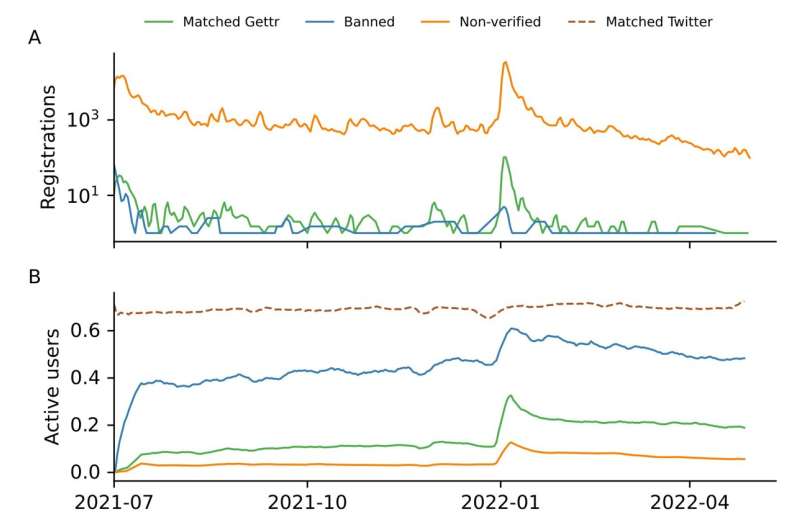This article has been reviewed according to Science X's editorial process and policies. Editors have highlighted the following attributes while ensuring the content's credibility:
fact-checked
peer-reviewed publication
trusted source
proofread
Right-wing social media benefited from high-profile suspensions on mainstream platforms, says study

Following the ban of prominent political figures from Twitter, such as former US President Donald Trump, many alt-tech platforms—offering uncensored speech and popular with the far-right—have gained significant influence across the digital media ecosystem.
In a new paper published in PNAS Nexus, researchers from City, University of London studied user engagement on Gettr, a Twitter-like platform that attracted right-wing 'celebrities' such as Steve Bannon, Alex Jones and Tucker Carlson.
The study finds that alt-tech platforms are increasingly important for facilitating far-right political discussions, and that the success of these platforms can be explained by their dependence on influential figureheads.
For example, following Twitter's suspension of Robert Malone (a US scientist spreading anti-vaccine content), podcaster Joe Rogan's endorsement on Gettr led to a spike in user registrations. However, these migrations can be short-lived. The study shows that many of these users left Gettr when Joe Rogan later criticized the platform.
But returning to the mainstream is not an option for users banned from Twitter. The academics found that users were up to six times more active on Gettr than those users who retained their Twitter use. For those users active on both platforms, the study showed that their content is more toxic on Twitter than it is on Gettr, and that they often share content from news media outlets that broadly align with the far-right, such as Breitbart News.
On Twitter, these users actively target toxic messages at political opponents—mainly Democrats, but also Republican outliers such as Liz Cheney and Adam Kinzinger. Both were recently called "traitors to the Republican Party" by Congresswoman Marjorie Taylor-Greene, an active Gettr user, due to their criticism of Trump's involvement in the January 6th US Capitol insurrection.
Importantly, the study looked at data up until January 2023, before Elon Musk's takeover of Twitter. Since then, the study estimates that approximately one third of the users who had been banned from Twitter prior to the takeover are now once again active on the rebranded "X." This raises the risk that the political opponents of these far-right social media users may receive increased toxic abuse in the future.
Amin Mekacher, the study's lead author, said, "We have seen a sudden growth of the alt-tech ecosystem in recent years. Several of these platforms have been accused of driving radicalization, leading to violent uprisings, as displayed by Gettr's involvement in the Brasilia insurrection in January 2023. Currently, these online spaces are scarcely monitored and we therefore risk missing telltale signs of collective radicalization."
The project is part of the IRIS Academic Research Group, an international coalition of academics from City, University of London and leading institutions including Harvard University, University of Cambridge, and others.
Professor Andrea Baronchelli, IRIS lead at City and senior author of the paper, said, "Even today, many people consider banning users from platforms like Facebook or Twitter as a way of silencing them. However, this no longer holds true. We are seeing a new era where alternative platforms are thriving and benefiting from those ousted by the mainstream.
"To address misinformation and radicalization, a systemic approach that considers the entire social media ecosystem is needed, and innovative policies should be devised accordingly."
More information: Amin Mekacher et al, The systemic impact of deplatforming on social media, PNAS Nexus (2023). DOI: 10.1093/pnasnexus/pgad346





















